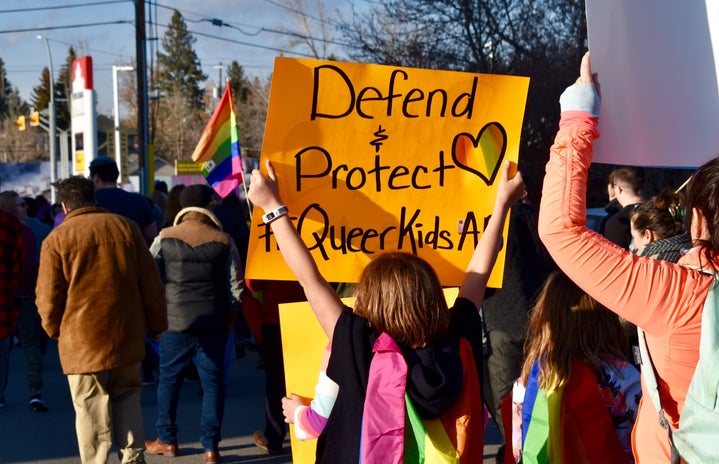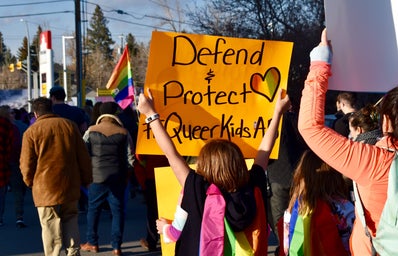I know that title sounds questionable. We see queerbaiting in TV, in characters that are written to indicate queerness but whose queerness is never addressed or progressed and seems to just be there to get brownie points. It’s a valid issue in the media that shouldn’t be ignored. But the reason that it is problematic is because these characters are constructed, someone has sat down and planned out the intricacies of their personalities and included this red herring that harms the queer community.
What many don’t seem to understand is that this term does not translate to real life. Real people cannot queerbait you. We see these accusations with Harry Styles, Billie Eilish, and most recently Kit Connor. Because these celebrities are fluid with their gender expression, or express interest in women but date men, or play a bisexual character on TV, suddenly people feel entitled to an explanation! But guess what, these real people owe you nothing. Queer people owe you no explanation or label, it is their business, heck, straight people owe you no explanation either! Even if Harry Styles is straight, since wearing colourful trousers and painting your nails is not necessarily a queer thing, he doesn’t need to specifically disclose that. Our speculating about his queerness is just enforcing gender roles on people we literally do not know. And it actually has negative effects on the community, on all of us.
Since the success of Netflix’s Heartstopper series keyboard warriors have been hounding the young actors to clarify their sexuality. Speculation and online bullying has run rife across social media accusing these people who are barely out of childhood to publicly come out. And unfortunately it worked. Kit Connor recently tweeted “back for a minute. I’m bi,” he wrote. “congrats for forcing an 18 year old to out himself. I think some of you missed the point of the show. Bye.” So all that this harassment achieved was to endanger a young person and dehumanise him. Make him no more than the character he plays and once again take away the rights of queer people.
The tragic thing is that this behaviour is exactly what the show, and the original comics, were advocating against. It talks about it often saying ‘There’s this idea that if you’re not straight, you have to tell all your family and friends immediately, like you owe it to them. But you don’t. You don’t have to do anything until you’re ready.’ Kit Connor wasn’t ready. And as a queer person who had the priviledge to come out when I decided the time was right, the thought of being pressured into it breaks my heart. Coming out should be a joyous occasion, when I came out a weight was lifted off my chest, despite negative reactions which everyone receives, I had spoken my truth and was living how I was meant to be. But Kit Connor did not get that, he was pressured into it, and without the joy of being prepared and comfortable in himself, this will forever be a deeply traumatising thing that has happened to him. What a kick in the teeth, especially for someone who has been a queer advocate and brilliant representation for the community.
All this aggression comes from the lack of genuine queer representation in the media. Members of the LGBTQ+ community are searching for queer characters and role models played by queer people, instead of straight/cis people profiting off of struggles that are not their own. This is a valid concern, and a problem that must be addressed within film and television. However, the answer is not outing young boys. What needs to happen is a change in understanding. For many, labels are the most important part of their identity, they are how they navigate through who they are. And yippee for them! I’m glad they found what makes them happy and secure in their identity. The problem is that not all people feel this way. Some find them overly restrictive, or haven’t found one that suits them yet or simply don’t like to put themselves in a box. This can be confusing and scary for people who stand by theirs so strongly as it opens us up to a world of unknowns where anyone can be anything and we don’t have control over it. Some people date under the queer umbrella their whole lives and never attach a label to themselves and that is in no way something to be shunned. Some ambiguity and basic respect for privacy would do the queer community some good. In an aim to create acceptance, exposure of queer people and their private lives has gone too far.
Social media has made celebrities something they never were before. They have no private life, they are not awarded the respect normal people are. This is the reason gaining fame as a young person can be so dangerous because you are more easily manipulated and you are exposed to so much at such a young age. Kit Connor is eighteen years old, at twenty I cannot imagine the pressures of being that famous now let alone two years ago. I certainly could not have coped with as much grace as he has displayed. What have we gained from outing him? Queer people do not deserve to suffer any more than life already makes them. Without the privacy that normal teenagers have when discovering their sexuality one can grow to resent who they are.
The message here is a simple one. Leave queer people alone to know themselves on their own time. Stop believing we have a right to any knowledge of these people’s lives. Start learning what these buzzwords you read online mean. If a few more people had educated themselves then perhaps queerbaiting wouldn’t have become so misused and it wouldn’t have been weaponised against a boy who is only trying to bring joy to others and figure out who he is.


